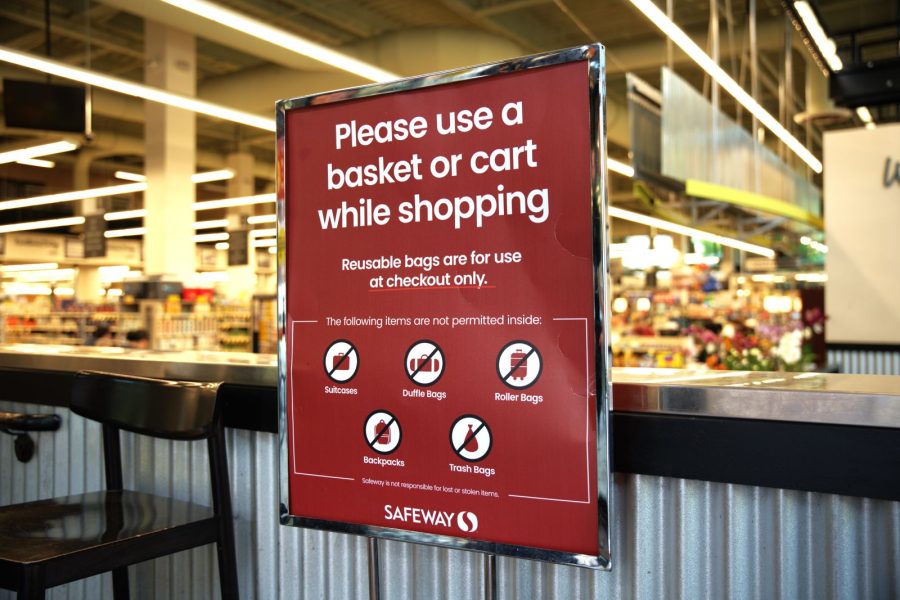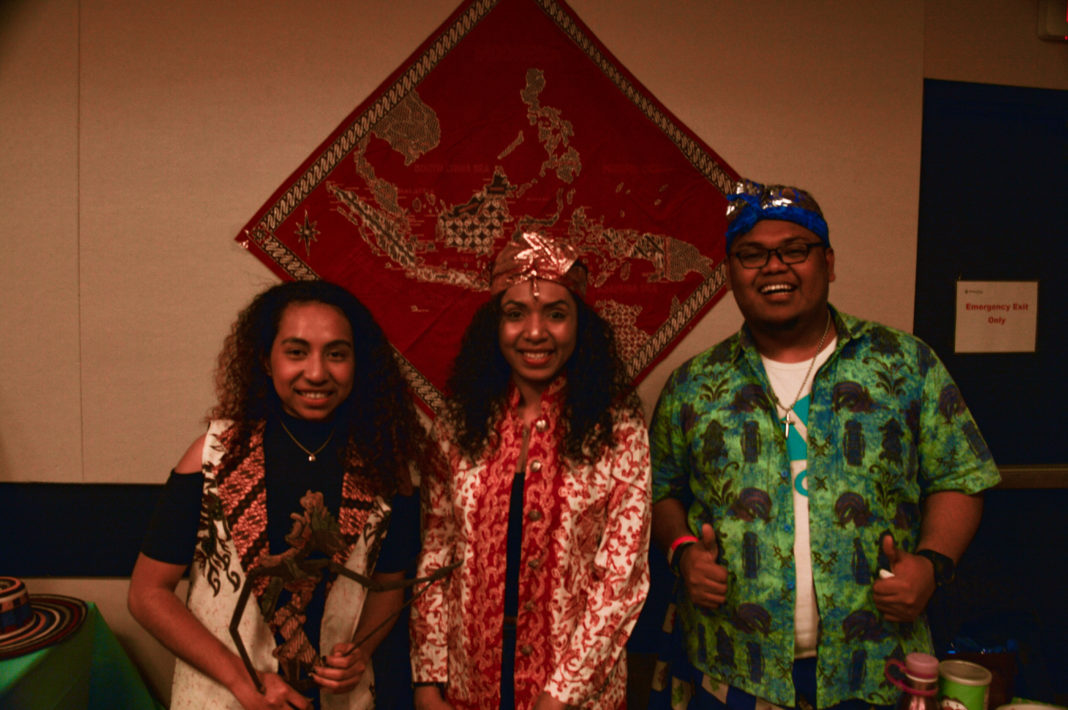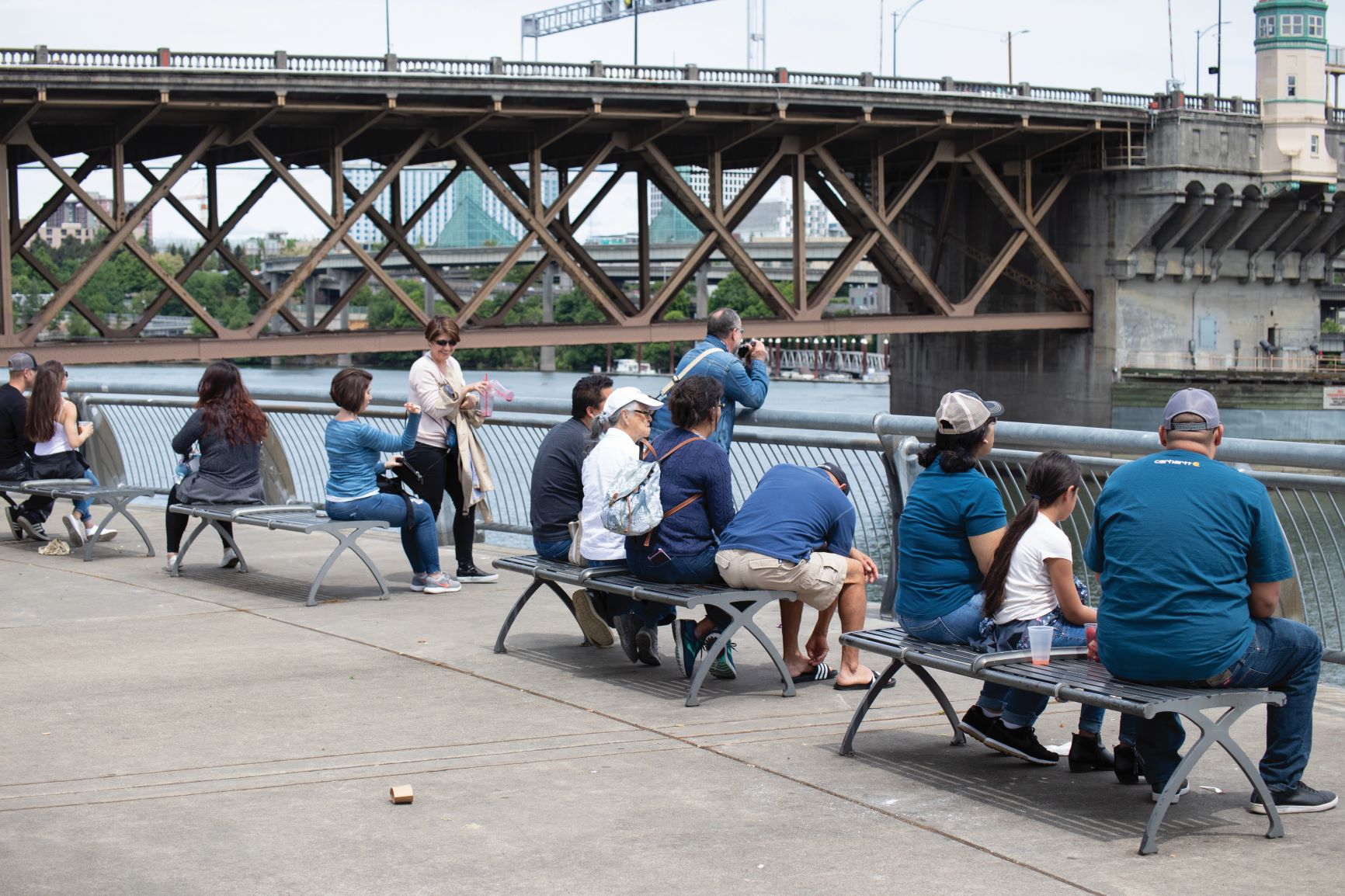This piece is part of an issue with a content warning regarding police violence. For a full acknowledgement of the content warning and source anonymity, please visit our article: About this special issue.
Just before 6 a.m. on Thursday, May 2, Portland Police Bureau (PPB) cars drove onto the Portland State campus and surrounded the Branford Price Millar Library, creating a perimeter which took over the block’s radius. One sound truck—an SUV with a bullhorn mounted atop—parked in front and blasted the following message:
“By request of Portland State University, the Portland Police Bureau is ordering you to leave Millar Library, and the South Park Blocks are now closed. Failure to leave the library and the South Park Blocks will subject you to arrest for second-degree trespass… Leave the south park blocks and the building by using the main front library exit. Leave now.”
Pro-Palestine protesters had gathered on campus grounds off and on from Thursday, April 25 through Thursday, May 2, occupying the library from Monday, April 30, to May 2. Their demands included a list of 13 objectives for the university to agree to. The occupation incurred the invitation of PPB despite concerns voiced by the faculty and students about the safety of the campus community.
Secret negotiations
On May 30, PSU President Ann Cudd opened up secret negotiations with protesters occupying the library, with facilitation by three faculty members: Professor Stephanie Wahab, Assistant Professor Molly Benitez and Senior Research Assistant Colleen Carroll. Having earlier united in the shared goal of acting as a bridge of communication between students and administration, the three reached out to Cudd and the students inside the library to offer assistance.
During the negotiations, they served as liaisons between the two groups.
“I think it’s just really important to make it clear that we were not working alongside the administration,” Carroll said. “We were neither working alongside the administration nor working alongside the students, right? There’s a different third role.”
Negotiations between student protesters and administrative staff have also played a role in other universities, as campus protests have cropped up across the United States. Other universities—such as Columbia University and University of California, Los Angeles—have faced university presidential sanctions due to police raids on encampments.
Not all have incited a forceful police presence, however. Four universities have prevented escalation through negotiations with student protesters, acquiescing to some demands and making promises to work on others according to a recent article by NPR.
PSU students involved with negotiations on the protest side claimed their goal was simple.
“We just wanted Cudd to put in writing that she would meet our demands,” one student protester said. “We knew divesting from Boeing wasn’t going to happen overnight. We just wanted her written word that the process would begin.”
The library occupation came just four days after Cudd publicly announced PSU would temporarily pause donations from Boeing. In a March press conference, Cudd said that, despite considering student complaints, the university would not cut ties with the company. In her April 26 email, Cudd also proposed a town hall meeting where students would be invited to debate the issue.
In response, student protesters referenced how a town hall which the Associated Students of Portland State University (ASPSU) Senate initially helped set up for PSU Students United for Palestinian Equal Rights (SUPER) to meet with the Board of Trustees earlier in the year never materialized. They also mentioned PSU had already received funding from Boeing for the current fiscal year, as PSU accepted the last donation on Sept. 12, 2023.
PSU receives around $28,000, for which the company provides PSU annually for scholarships and emergency funds.
“A ‘pause’ does not meet the demands that we listed for the university,” said one of the student protestors involved in the negotiations. “This is passivism disguised under the lens of continuing discourse… We have no reason to believe a debate will change her mind after months of student action hasn’t.”
By midnight on April 30, Cudd had drafted a negotiation contract for the protestors to sign. In it, PSU students occupying the library were guaranteed they would not face academic repercussions for their actions and the university would not press criminal charges. The contract stipulated they hand over their names and student ID numbers to the administration. The contract made no mention of the protesters’ other demands.
The student negotiating team refused to sign the contract, because it failed to meet their demands, and handing over their identifying information without a guarantee of legal amnesty presented too many risks.
“Some of the concerns that we heard was an inability to trust what the administration was saying,” Carroll said. “The requirement to collect student names felt unacceptable, and there could have been alternatives to that. Unfortunately, that didn’t happen.”
The faculty members claim they spent most of the night making constant attempts to stall the administration from bringing police onto campus, citing instances and statistics of police violence to prevent Cudd from making the call.
Wahab referenced the charged history of police on campus with the shooting of Jason Washington by PSU police officers in 2018.
“It’s not just like we don’t believe in the police,” Wahab said. “It is that the police have killed somebody on our campus. There is a history that lives in people’s cells and memory and hearts, and it’s a wound that is still so open and tender on our campus.”
However, to the triad of faculty messengers, Cudd’s decision to involve the police seemed imminent.
“To us, it seemed inevitable that the police would come,” Benitez said. “She had already turned it over to them. She said multiple times [that] she trusted them to not hurt people. At some points she was just like, ‘well, what else is there? What else is there other than the police?’”
According to the faculty members, the administration considered meeting the protester’s demands entirely off the table.
After the negotiations fell through, the student negotiation team occupying the library and the administration had no further contact—nor did the administration and the faculty members who had served as liaisons.
At 4:15 p.m. on May 2, Cudd emailed the PSU community, bringing attention to the no-longer-secret negotiations. In it, she stated, “I negotiated with students, with the assistance of three faculty members.”
“We didn’t have any power,” Carroll said. “No power was vested in us to make terms. We were ferrying messages between people.”
“Inevitable” police force
Students and faculty stated their greatest concerns about involving the police on a wide scale were the safety risks this would bring to students and other demonstrators.
“I have limited—but some substantial—concerns to the fact that police as an occupying force are generally not for the safety of the people,” said a student protestor who goes by the nickname Glasses. “My main concern is the specific safety of people because the police in Portland have a tendency to overreact and be over-violent like a lot of police bureaus in the country.”
Police used a variety of crowd control tactics during the initial raid of the library and subsequent protests. On numerous occasions, police pushed forward into crowds of protestors, knocking them to the ground. Reporters recorded several instances in which three or more officers knelt on the backs of individuals in order to arrest them.
In one instance caught on video by Vanguard, police randomly selected a person from the crowd of linked arms and dragged them into the cloud of a smoke grenade before throwing them onto the ground. They then lifted the individual up and arrested them. Tactical yellow smoke rose in the background as individuals standing nearby were threatened by officers with pepper spray and pepper guns to back away.
One woman—a student—received bruising and abrasions to her breast when a police officer reportedly reached under her clothing while trying to pull her to the ground. Fellow protesters reported immediately after seeing the same officer repeatedly striking a Black PSU student in the face until he was pulled off by another officer.
Several more protesters received pepper spray in their eyes. One student protestor—receiving a particularly bad amount of pepper spray—sat on the steps of the Native American Student and Community Center while fellow protestors poured what water they had into their eyes, screaming for one of the medics who had been on site of the library throughout the occupation. A Portland Fire and Rescue medic crossed the street from the group of police to attend, assuming the call was meant for them. Protesters immediately shouted for the officer to go away, calling out still for a medic they were willing to trust.
Dr. Tom H. Hastings—a coordinator of conflict resolution at PSU and volunteer member of Portland Peace Team—described his and two other Peace Team members’ attempts at de-escalating agitated protesters in a statement to Vanguard.
“We mentioned that the cops were remaining calm on the surface, but this level of antagonism was very likely to affect them as humans who feel disrespected,” Hastings stated. “We asked the enraged protesters if they were okay stoking a response that would likely produce a lot of pain behind closed doors if the occupying young people on the inside of the library were arrested by cops who had been targets of hate and rage.”
He described some protesters scoffing while others softened in response.
One professor in the College of Liberal Arts and Sciences who wished to remain anonymous said that, despite the safety concerns posed by police for some, he understood the situation to call for it.
“Of course students have a right to be upset about the police being called in,” the professor said. “[But] I don’t see how it could have been otherwise, given that the library had been made into a fire hazard… The university was fearful for the students safety and had to bring that situation to an end.”
Cudd responded to questions regarding the administrative decision to involve PPB during a faculty senate meeting on May 6.
“To those who have condemned our action of bringing the Portland police on campus, I would ask this: how long should I have allowed the protest to stay in the library, which was quickly rendered unsafe as a fire hazard by the occupiers?” Cudd said. “How many times should I have offered students an opportunity to leave without consequences?”
Arrests
Police made a total of 30 arrests that day, six of whom were identified by police as active PSU students. Vanguard has identified at least nine as being affiliated with the university.
In a statement, PPB claims to have arrested three individuals inside of the library, one of whom police arrested after they reportedly deployed a fire extinguisher at an officer.
Around 9 a.m. on May 2, about 28 protesters exited the front doors of the library carrying garbage can shields and umbrellas, running toward the crowd in what appeared to be an attempt to escape the police. Many of the protesters were able to avoid the police, however, one protester was forcefully apprehended by officers.
In a video captured by Vanguard, the protester was seen running toward the crowd when an officer came running into the protester’s trajectory, striking the protester’s shield and knocking them down. Several officers then came to the scene and assisted the striking officer in carrying the protester away and zip-tying their hands behind their back.
Sergeant Kevin Allen said in a PPB press conference later that day the arrest occurred due to the protester striking the officer, resulting in their arrest.
A majority of arrests occurred on SW Broadway during protesters’ efforts to prevent police custody vans from taking away those already arrested. Police further arrested protesters during the demonstration, which continued at the police perimeter of the library and South Park Blocks throughout the remainder of the day.
Protests continue, and so do PSU Alerts
On May 9, demonstrators held a smaller encampment in front of Hoffman Hall. Protestors set up three tents in front of the building around 9 p.m., inciting a police response within 30 minutes.
A team of approximately 20 PPB officers entered the premises, taking down and confiscating tents. Protestors responded by moving toward the police, eventually prompting police to abandon tents and retreat. PPB Central Bike Squad and vehicular PPB brandished pepper spray and took photos of protestors on their phones, driving over a tent as they left.
The following day, Cudd claimed responsibility for calling the police, citing tents in a campus-wide email as a violation of university event policies.
Protesters rejoined on campus the evening of May 10 at the Walk of Heroines. Shortly after, PSU Alerts sent out a campus-wide notification about an incident on campus, warning students to shelter in place.
Some students have found the use of alerts excessive—including those issued during the library occupation. One such example is the PSU Alert issued on May 1 which warned of “Police Activity in the South Park Blocks” despite no police presence seen in or around the area at the time.
Arlo, a PSU graduate student, expressed incredulity at the frequency and content of the alerts.
“Even the security alerts were weaponized to instill paranoia, fear, reactivity, insecurity and to direct that towards the protesters,” they said. “Because if it was about genuine campus safety, there would have been information. There would have been action That’s just so wildly irresponsible and incomprehensible to me, because I don’t know what the procedure for putting out a campus alert is.”
PSU’s Campus Public Safety Office (CPSO) sent an email on May 11 regarding the PSU Alert sent on May 10. In it, they stated CPSO had exercised “an abundance of caution” out of concerns of another potential occupation of the Parkmill building.
Protesters continue to host rallies and pro-Palestine community events on campus, as the university has yet to respond to student demands since negotiations broke down on May 1.
“I have had to grapple a lot with whether or not I can continue studying under an institution that is so willing to deploy police on students to protect property while violently assaulting students,” Arlo said.






